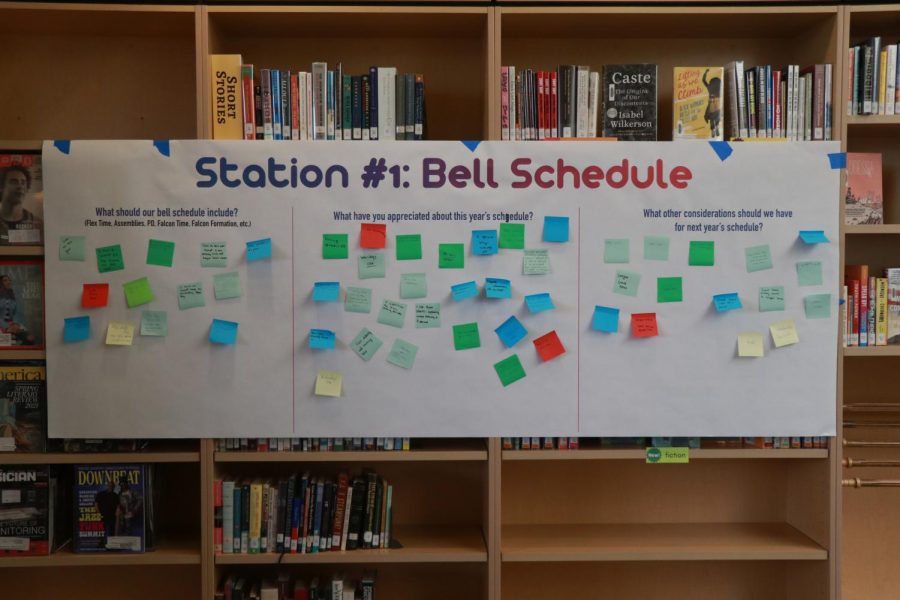We Deserve To Be Listened To: Adjust Next Year’s Bell Schedule
On April 27, students wrote down their thoughts about next school year’s bell schedule on post-it notes in the library after classes.
May 5, 2021
Beep. Beep. Beep.
Just five more minutes, please.
Back when I didn’t even recognize the term “COVID-19,” I woke up with the quietly chirping birds before sunrise for my zero period choir class. In-class warm-ups typically started at 7 a.m., but I often found myself sneaking in quietly around 7:02 a.m., tiptoeing my way to my seat around my peers humming, lip trilling, and stretching.
And as I worked my way through the school day, inevitably, my eyelids would get heavier and heavier around third or fourth period. I always felt more and more tired and unfocused.
Now, with La Salle’s current four-day hybrid schedule, zero period starts at 8 a.m. instead of 7 a.m. In the mornings, as I pull open the blinds, the sun startles me into action. I can hear my brother showering, because now we can drive to school at the same time.
An hour does not sound like a huge difference in sleep, yet it is crucial to keeping me awake after late nights of homework and theater rehearsal. According to the University of Georgia, a lack of sleep can lead to a weakened immune system, higher stress, a lower GPA and decreased academic performance, increased mental health issues, and more. Even one hour can make a difference.
And for those who are not taking zero-period classes, their day starts at 9 a.m., giving even more opportunities to sleep in and get the rest they need.
Just because La Salle is returning to increased in-person learning, as we look towards next year we should not simply return to the previous norm. It is crucial that we take what we have learned from this experience and apply it to our future plans in a positive way.
Similar to the later start time, asynchronous classes on Wednesdays are another implementation from the COVID-19 pandemic that students and staff should continue with.
In lieu of straight seven Mondays, where teachers would cram in half a lesson in the short amount of time they had as students rushed to and from all of their courses, lunch, and breaks in one day, Wednesdays have been a saving grace in catching up on late work, getting ahead on projects, and scheduling meetings with teachers and counselors.
Flex periods have had the same effect — on Tuesdays and Fridays, sports teams, clubs, extracurriculars, and classes can block out time to meet and connect with one another. Or, if you don’t have anything scheduled, you can go home early and take some time to yourself.
These periods are also much more organized than Falcon Formation, which, in my experience, has always been a mess of confusing videos and unrelated chattering. Taking this time to focus on my work and learning has been much more effective.
However, as we choose to hopefully keep some of the changes we’ve made this year, that doesn’t mean the schedule needs to stay exactly as it is now.
For example, 20 minutes is not enough time for students and staff to eat lunch. Especially with the spaced, individual seating, where you can’t just squeeze your butt in next to your friends, it can be difficult to find a place to sit for everyone, and by the time you accomplish this, you’ve wasted so much time that you’re hardly able to eat.
And once you’ve missed your lunch opportunity, you’re not allowed to grab a quick bite inside of any of your classes — or in the building at all, for that matter.
When people skip meals, their metabolism slows down and their blood sugar lowers, leading to feelings of irritability, confusion, and fatigue, as well as weight gain.
To allow more time for lunch, the passing periods between classes should be cut down to five minutes from ten, and the one-directional hallways should be removed entirely.
La Salle’s hallways are wide enough to accommodate for two-way walking as people usually use hallways. We even see this in the science wing of our school — why can that hallway be two-directional, while everything else must be one direction?
Next year, we should cut the extra walking and use the hallways as they’re intended, re-allocating that extra walking time to allow students and staff ample time to eat lunch.
There are many things we have learned from the pandemic, and we can keep learning as we go. But overall, I hope that the administrative team listens to students and staff surrounding the bell schedule for next year. With how hectic everything has been for the past two years, we deserve to be listened to.





